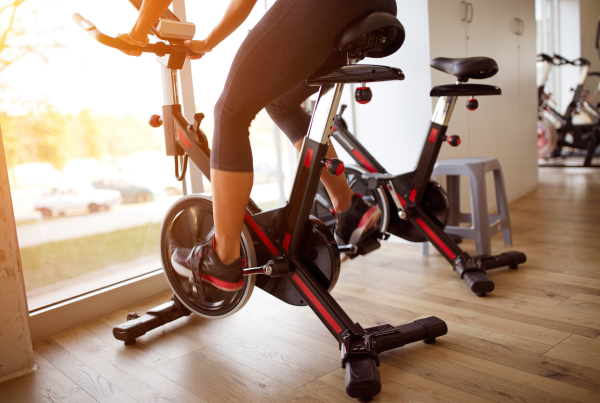What do you see when you look at the client in front of you? I mean really see. We all check form and probably weight and balance. We spend a lot of time with our clients every week and we get told all manner of things. We hear about the highs and the lows of their lives and we get the laughs and the tears, don’t we?
Sometimes we hear or suspect things we would really rather not know about. I’m thinking of the cheating partner, the compulsive gambler and the difficult children (to name but a few). We nod wisely and try very hard to focus on the session.
However, sometimes what we hear may be more serious than that. We may have a client experiencing domestic abuse (DA). This is not something we can turn a blind eye to – so what should we, as fitness professionals, do if we suspect a client of ours is suffering from DA?
What is domestic abuse?
Women’s Aid defines DA as “an incident or pattern of incidents of controlling, coercive, threatening, degrading and violent behaviour, including sexual violence, in the majority of cases by a partner or ex-partner, but also by a family member or carer. It is very common.”
Not all DA makes a physical mark on the victim/survivor but all DA has an impact. It happens to people in all walks of life.
Here are some figures (ONS Domestic abuse prevalence and trends, England and Wales: year ending March 2021) – but remember, these are the ones that were reported to the police. There is no mention of those that weren’t reported:
- The police recorded a total of 1,459,663 domestic abuse-related incidents and crimes in England and Wales in the year ending March 2021.
- Of these, 845,734 were recorded as domestic abuse-related crimes, an increase of 6% from the previous year, representing 18% of all offences recorded by the police in the year ending March 2021.
- Estimates from our most recent Crime Survey for England and Wales, year ending March 2020, show 5.5% of adults aged 16 to 74 years (2.3 million) experienced domestic abuse in the 12 months prior.
The Crown Prosecution Services states, “Controlling behaviour is: a range of acts designed to make a person subordinate and/or dependent by isolating them from sources of support, exploiting their resources and capacities for personal gain, depriving them of the means needed for independence, resistance and escape and regulating their everyday behaviour.
“Coercive behaviour is: an act or a pattern of acts of assaults, threats, humiliation and intimidation or other abuse that is used to harm, punish, or frighten their victim.”
You can read more about DA here:
What is domestic abuse? – Women’s Aid (womensaid.org.uk)
Coercive control – Women’s Aid (womensaid.org.uk)
How can we help?
This is a lot to take in, and helping someone who is experiencing DA is a highly skilled job. What, as PTs, should we do if we are told that one of our clients is in an abusive relationship?
You may initially feel like panicking but try not to. I am going to give you a few hints so that you know where to direct your client to get the help they might want, should the need arise.
It’s not for us, as PTs, to work out if this is DA and what to do. If your client said they were unwell you wouldn’t treat them – you would suggest their GP. If they tell you their partner is controlling them, hurting them, threatening them – have a few numbers to hand.
And again, if they said their throat was sore, you wouldn’t take a swab or guess what antibiotic they needed. So, if they say they are worried about their relationship, it’s not your role to discuss the details but it is your role to say you know of some helpful people they can ring.
It’s up to us to have a bit of knowledge about DA and not to seem shocked.
What support is available for people experiencing domestic abuse?
There are lots of different support options for people experiencing DA, so it can help to speak to an independent adviser or helpline to discuss the options available.
IDVA Support
IDVA stands for Independent Domestic Violence Adviser. IDVAs provide support to improve the safety and wellbeing of people who are victim/survivors of domestic abuse. IDVA support is tailored to the needs and wishes of the person they are working with. Some examples of support they can provide include:
- discussions around the risks and impact of DA
- help making a personal safety plan
- information about:
- housing options
- civil remedies
- criminal justice processes
- emotional support options
- further local support services and safety options
- advocacy and support to link in with other services you are working with
- guidance to professionals about how to respond to DA.
Every area of England and Wales has an IDVA service (or equivalent). If you want to find your local IDVA service, you can contact the National Domestic Violence Helpline. Call 0808 2000 247 (24 hours); webchat: https://www.nationaldahelpline.org.uk/en/Chat-to-us-online (Mon-Fri, 10:00-18:00); support in BSL: https://www.nationaldahelpline.org.uk/en/bsl (Mon-Fri, 10:00-18:00).
You can also view the Women’s Aid service directory here: https://www.womensaid.org.uk/domestic-abuse-directory/
Helplines
There are a variety of national helplines to support victims/survivors of DA. They can offer immediate support and help find services in your local area that can provide longer term support.
- National Domestic Violence Helpline. Call 0808 2000 247 (24 hours); webchat: https://www.nationaldahelpline.org.uk/en/Chat-to-us-online (Mon-Fri, 10:00-18:00); support in BSL: https://www.nationaldahelpline.org.uk/en/bsl (Mon-Fri, 10:00-18:00).
- (Welsh Language) Live Fear Free Helpline. Call 0808 80 10 800 (24 hours); website: https://www.welshwomensaid.org.uk/what-we-do/live-fear-free-helpline/
- Sign Health Crisis Helpline. Text DEAF to 85258 (24 hours); website: https://signhealth.org.uk/with-deaf-people/crisis-text-service/
- National LGBT+ Domestic Abuse Helpline. Call 0800 999 5428 (Mon-Fri, 10:00-17:00, with extended hours on Weds and Thurs of 10:00-20:00).
- Men’s Advice Line. Call 0808 801 0327 (Mon-Fri, 09:00-20:00).
- Karma Nirvana (for help with ‘honour’-based abuse). Call 0800 5999 247 (Mon-Fri, 09:00-17:00).
If you are hurting someone close to you, or are concerned about someone else who is doing so, the following service can help:
- Respect Helpline. Call 0808 802 4040 (Mon-Fri, 09:00-20:00).
Simply by referring your client to any of these services, you could be making a difference to their life.
With thanks to Eleanor and Standing Together for their wisdom and guidance








